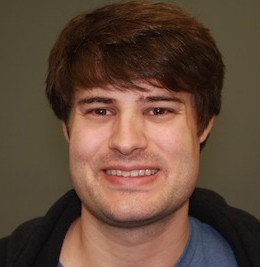Media Inquiries
- 615-322-6397 Email
Latest Stories
- Vanderbilt Peabody College announces new online certificate in applied behavior analysis
- David Cortez wins Protein Society award for contributions to basic protein science
- Vanderbilt University, University of Cambridge, King’s College Cambridge, the White House and United Kingdom’s Government Communications Headquarters to convene and discuss critical issues pertaining to post-quantum cryptography
Matthew Feldman, a graduate research assistant in physics and astronomy, is one of only 195 students nationwide who have been awarded a National Defense Science and Engineering Graduate (NDSEG) Fellowship this year.

The fellowship, which is given to U.S. citizens and nationals who intend to pursue a doctoral degree in one of fifteen fields critical to national defense, is a portable fellowship that allows its recipients to attend the U.S. university of their choice. The fellowship lasts for four years and pays for full tuition and fees, a monthly stipend and basic medical insurance.
“The NDSEG fellowship will provide me with stable funding for the remainder of my graduate career and therefore the freedom to take greater risks and develop greater independence in my research,” Feldman said.
Since January 2017, Feldman has been splitting his time between Vanderbilt and Oak Ridge National Laboratory to build a special instrument that exploits the dual wave-particle nature of light to measure the properties of individual and entangled photons. Before that, he worked at the Vanderbilt Institute of Imaging Science on the development of next-generation MRI machines.
Feldman’s research interests lie in the development of quantum systems in general and specifically their application to making faster and more powerful computers. As the speed of computers has increased, the size of their fundamental component, the transistor, has shrunk and is now approaching the point where the classical laws of physics give way to the laws of quantum mechanics, which holds sway in the realm of the ultrasmall, like atoms and molecules. Because quantum physics is quite different from classical physics, designing quantum computers is a tremendous challenge.
Most efforts to develop quantum processors have focused on isolating them from the environment, a feat requiring extreme measures such as cooling them to temperatures near absolute zero. Feldman’s work will focus on using nanofabrication techniques to customize the environment of quantum processors so these extremely expensive measures are not required: an alternative approach that, if it works, could significantly reduce the cost of quantum computing.
“I am extremely grateful for the support and guidance I have received,” Feldman said. “In particular, I thank Dr. Ben Lawrie and Professor Norman Tolk for their guidance in the application process and their letters of reference. I thank my wife Dr. Olivia Prosper for her constant support, my father-in-law Professor Harrison Prosper and my Ph.D. advisor Professor Richard Haglund for their mentorship.”